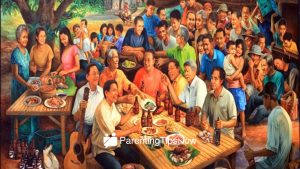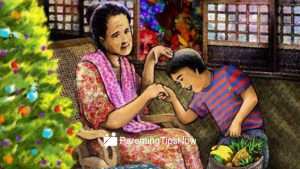Table of Contents
ToggleEmbedded within the fabric of Filipino society lies a deep-rooted reverence for familial ties that transcends mere blood relations; it embodies a collective spirit that shapes societal norms and behaviors. This article aims to explore how the Filipino family acts as a catalyst for social cohesion, economic advancement, and cultural preservation within Philippine communities. By unraveling the complexities inherent in these familial structures, we gain insight into how they serve as pillars upon which broader societal foundations rest – ultimately illuminating their indispensable role in shaping the very essence of Filipino society.
The Importance of the Filipino Family
The Filipino family holds a central place in society, with its significance deeply rooted in cultural values and traditions. Family ties are considered sacred, creating a strong support system that shapes individuals’ identities and behaviors. This close-knit structure fosters unity, resilience, and enduring bonds that extend beyond immediate relatives to include the wider community.
Within the Filipino family dynamic, respect for elders is paramount. The concept of utang na loob, or debt of gratitude, underscores the reciprocal nature of relationships within the family unit. This culture of interconnectedness emphasizes collective well-being over individual pursuits, promoting harmony and cooperation in both personal and societal spheres. The importance of maintaining familial harmony is reflected not only in everyday interactions but also during significant life events and celebrations where kinship is celebrated with fervor.

How Important is the Filipino Family in Shaping the Philippine Society?
The Filipino family plays a vital role in shaping Philippine society, serving as the cornerstone of social structure and values. Embedded in a strong collectivist culture, the close-knit nature of Filipino families fosters unity, support, and tradition. The concept of Bayanihan, or communal unity, is deeply ingrained in family dynamics, with members often coming together to help one another overcome challenges.
Furthermore, the importance placed on respect for elders and authority within the family translates into broader societal norms. The emphasis on hierarchy and deference to parents influences decision-making processes at both personal and institutional levels. This reverence for familial authority is not just limited to individual households but extends to governance structures as well, manifesting in the value Filipinos place on leadership figures who embody paternalistic qualities.

Traditional Filipino Family Values that Make Us Distinct From Other Cultures
The traditional Filipino family values such as utang na loob (debt of gratitude) and pakikisama (harmonious relationships with others) set us apart from other cultures. These values emphasize the importance of relationships, respect, and reciprocity within the family unit. Unlike individualistic societies, Filipinos prioritize the collective well-being of the family over personal desires.
Furthermore, the strong sense of filial piety in Filipino culture highlights the respect for elders and ancestors. This reverence is manifested in various traditions, like pagmamano (blessing by taking an elder’s hand to one’s forehead) and pagbibigay-galang (showing respect through actions). Such practices reinforce the importance of familial ties that extend beyond immediate family members.
In a rapidly changing world where modernization often threatens traditional values, holding onto these core beliefs helps maintain not only our cultural identity but also provides a foundation for strong familial bonds. The resilience and adaptability that these values instill serve as a guiding light in navigating contemporary challenges while preserving our unique identity as Filipinos.
Here are 7 traditional Filipino family values that make us distinctively different from other cultures:
Filipino Family Value #1: Importance of Extended Family Support
The importance of extended family support in Filipino culture cannot be understated. Beyond immediate family members, the Filipino concept of Bayanihan extends to relatives near and far, creating a robust network of support. In times of celebration or crisis, the extended family steps in seamlessly to offer help, guidance, and resources.
This interconnected web of relationships not only strengthens bonds but also ensures a safety net for individual family units. From financial assistance to emotional comfort, the extended family provides a sense of security and belonging that is deeply ingrained in Filipino society. In this way, each member plays a vital role within the larger familial ecosystem, fostering unity and resilience in the face of challenges.

Filipino Family Value #2: Emphasis on Respect for Elders
In Filipino culture, respect for elders is not just a formality but a deeply ingrained value that shapes family dynamics. The emphasis on respecting elders is rooted in the belief that they hold wisdom and experience to guide younger members of the family. This respect goes beyond mere obedience; it involves listening attentively to their stories, seeking their advice, and honoring their contributions to the family.
The Filipino emphasis on respect for elders also extends to caring for their needs as they age. It is common for multiple generations to live under one roof, with the younger members taking on responsibilities to ensure the well-being and comfort of their elderly relatives. Intergenerational care creates strong bonds within the family and fosters a sense of unity and support that sustains everyone through life’s challenges.

Filipino Family Value #3: Strong Sense of Community and Bayanihan
In a world where individualism often takes precedence, Filipinos value a strong sense of community, and Bayanihan stands out as a beacon of unity and interconnectedness. This intrinsic aspect of Filipino culture emphasizes the idea that one’s well-being is deeply linked to the welfare of the entire community. The concept of Bayanihan, or communal unity and cooperation, highlights the importance placed on helping others in times of need, showing solidarity in both joyful celebrations and challenging circumstances.
This emphasis on community extends beyond familial ties to include neighbors, friends, and even strangers who may be in need. Through Bayanihan, Filipinos demonstrate a remarkable ability to come together to accomplish shared goals and solve problems collectively. It is this unwavering spirit of camaraderie and mutual support that continues to define the Filipino family as not just a unit bound by blood but as an integral part of a larger social fabric woven with compassion and goodwill.

Filipino Family Value #4: Value of Hospitality and Generosity
In Filipino culture, the values of hospitality and generosity are deeply ingrained in the fabric of society. The act of welcoming guests with open arms, known as pakikisama, is a key aspect of Filipino hospitality. It goes beyond mere politeness; it reflects a genuine desire to make others feel comfortable and valued.
Generosity is also highly valued in Filipino families, with the belief that sharing what you have, no matter how little, brings blessings and creates stronger connections with others. This practice extends not only to material possessions but also to time, effort, and emotional support. Through these acts of kindness and warmth, Filipinos strengthen bonds within their families and communities, fostering a sense of unity and care that transcends individual needs.

Filipino Family Value #5: Resilience in Facing Adversity Together
In times of adversity, Filipino families exemplify remarkable resilience by coming together as a unit to face challenges head-on. This inherent trait is deeply rooted in the collective strength and unwavering support system that define Filipino familial bonds. Whether it’s an economic setback, a natural disaster, or personal hardship, families in the Philippines display a remarkable ability to persevere and overcome obstacles through unity and solidarity.
The concept of Bayanihan, or communal unity and cooperation in times of need, lies at the heart of Filipino resilience. Families draw on this tradition to weather storms collectively, reminding one another that they are not alone in facing adversity. Through shared values such as empathy, loyalty, and mutual support, Filipino families stand as a formidable force capable of triumphing over even the most daunting challenges that life throws their way.

Filipino Family Value #6: Emphasis on Education and Family Success
In the Filipino culture, education is highly valued as a pathway to success and a means of uplifting the entire family. Parents often make significant sacrifices to ensure their children have access to quality education, recognizing it as a key investment for future prosperity. This emphasis on academic achievement not only reflects individual aspirations but also contributes to the collective success of the family unit.
Moreover, the pursuit of education in Filipino families is seen as a way to break the cycle of poverty and create opportunities for social mobility. There is a strong belief that through hard work and dedication to learning, anyone can achieve their goals, regardless of their background. This value, instilled in children from an early age, fosters resilience, determination, and a sense of responsibility towards one’s own family and community.

Filipino Family Value #7: Faith and Spirituality
For Filipinos, faith and spirituality form the bedrock of family values. Deeply ingrained religious beliefs and practices are woven into the fabric of everyday life, guiding families through trials and triumphs. Central to this value is the concept of kapwa, or interconnectedness with others, rooted in Christian teachings that emphasize love for one’s neighbor.
Moreover, Filipino families find strength in prayer and communal worship, coming together to seek solace and guidance from a higher power during times of adversity. This shared spiritual foundation fosters unity and resilience within the family unit, instilling a sense of purpose beyond individual needs. In essence, faith serves as a beacon of hope that illuminates their path through life’s uncertainties.

Historical Perspective: Filipino Family Values in the Philippines
Throughout history, Filipino family values have served as the bedrock of society, shaping cultural norms and traditions. One key value that remains strong is *utang na loob*, which emphasizes the importance of reciprocity and gratitude within families. This concept extends beyond just immediate relatives to include extended family members and even close friends, creating a web of interconnected relationships that provide support in times of need.
Another enduring value is *hiya*, or a sense of shame or disgrace with respect to societal expectations. While this may come off as negative to some, it actually serves as a motivating factor for individuals to act in accordance with social norms and uphold their family’s honor. Through these unique values, Filipino families continue to play a vital role in maintaining stability and unity within communities across the Philippines.

Economic Contribution of Filipino Family: Financial Support and Stability
The economic contribution of Filipino families cannot be overstated when considering the stability and financial support they provide. In a country where extended family ties are deeply ingrained, it is common for multiple generations to pool resources and support each other financially. This practice not only ensures the well-being of individual family members but also contributes to the overall economic resilience of Filipino society.
Moreover, the sense of duty and responsibility that Filipinos feel towards their families drives them to work hard and strive for financial stability. This strong family-centered mindset motivates individuals to put their loved one’s needs above their own, leading to sacrifices in pursuit of providing a better future for their families. As such, the economic contribution of every Filipino family member plays a vital role in sustaining the foundation of societal well-being and progress.
Social Cohesion in the Filipino Family: Building Strong Community Bonds
Social cohesion in the Filipino family plays a crucial role in building strong community bonds that extend beyond blood relations. The inherent value of Bayanihan, or communal unity, is deeply rooted in Filipino culture and serves as a foundation for fostering social harmony within families and communities. This spirit of cooperation and mutual support not only strengthens familial ties but also creates a ripple effect that contributes to the overall well-being of society.
In times of adversity or celebration, Filipino families come together to provide emotional, financial, and moral support to each other, showcasing resilience and solidarity. By instilling values such as respect for elders, a strong work ethic, and compassion for others, Filipino families nurture an environment where individuals learn the importance of empathy and interconnectedness. These values are not just taught but are exemplified through daily actions, reinforcing the significance of social cohesion in maintaining a sense of belonging and unity within the larger community.

Cultural Preservation of Filipino Family: Passing on Traditions
In the heart of Filipino family dynamics lies a deep-seated commitment to cultural preservation through the passing down of traditions. This intrinsic value transcends generations, ensuring that customs, beliefs, and practices are not only cherished but upheld as integral components of familial identity. From traditional celebrations like fiestas and religious observances to everyday rituals such as sharing meals and stories, each moment becomes an opportunity for a legacy to flourish.
Fundamentally rooted in interconnectedness and communal harmony, Filipino families view tradition as a bridge that binds the past, present, and future. The transmission of these age-old practices instills a sense of pride and belonging among family members, fostering a collective sense of identity that resonates beyond individual differences. As children learn from their elders the significance of honoring ancestors or upholding cultural values, they become custodians of heritage in a rapidly changing world.
Emotional Support System: Filipino Family’s Mental Well-being and Resilience
In times of hardship and adversity, the Filipino family’s emotional support system serves as a crucial pillar for mental well-being and resilience. The tightly-knit nature of Filipino families fosters a sense of belonging, understanding, and unconditional love that uplifts members during challenging moments. This strong support network is deeply rooted in cultural values such as utang na loob or indebtedness, which emphasizes the reciprocal nature of care and assistance within the family unit.
Moreover, the interconnectedness among family members in Filipino culture creates a safety net for individuals facing mental health struggles. Open communication and empathy are key components that enable family members to express their emotions freely without fear of judgment. Through shared experiences, traditions, and rituals that promote bonding and unity, Filipino families continuously reinforce their collective strength in overcoming adversities together.

Influence of Filipino Family on Moral Development and Societal Norms
The influence of the Filipino family on moral development and societal norms is deeply rooted in the culture and values that have been passed down through generations. Family plays a central role in shaping an individual’s character, guiding them toward understanding the importance of respect, compassion, and responsibility within society.
Filipino families emphasize close-knit relationships, where shared values are upheld and transmitted from parents to children. This strong sense of community within families fosters a collective mindset that values unity and cooperation over individualism. As a result, individuals are instilled with a strong sense of empathy and consideration for others, leading to a more harmonious society based on mutual respect and understanding.

Challenges Faced by a Filipino Family Today
One of the key challenges faced by Filipino families today is the impact of migration on family dynamics. Many Filipino families experience separation due to one or more family members working abroad, leading to emotional strain and difficulty maintaining strong connections. The sacrifices made for better job opportunities often come at the cost of familial bonds, requiring families to navigate complex emotions and communication barriers.
Another significant challenge is the pressure to support extended family members back home financially. This responsibility can weigh heavily on Filipino families, especially when facing economic uncertainties or unexpected expenses. Balancing the needs of immediate and extended family members while also ensuring their own well-being can create a delicate juggling act for many Filipino households, testing their resilience and resourcefulness in times of need.
Final Words: The Enduring Influence of Filipino Family in Philippine Society
As we explore the enduring influence of Filipino families in Philippine society, it becomes evident that the strong emphasis on close-knit familial bonds plays a crucial role in shaping the nation’s cultural fabric. The deep-rooted sense of community and interconnectedness within Filipino families forms the backbone of societal structures, fostering resilience and support that transcends generations. This dynamic interplay between family ties and societal norms creates a unique foundation that values unity, harmony, and mutual respect.
Moreover, the Filipino family unit serves as a bedrock for instilling core values such as gratitude, humility, and compassion in individuals. These intrinsic qualities are not only cherished within households but also extend outward to shape interactions in wider social contexts. By embracing these values collectively through familial relationships, Filipinos continue to uphold traditions and customs that have withstood the tests of time, solidifying their legacy as steadfast pillars in Philippine society.














